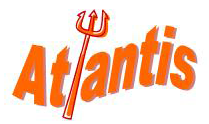
ATLANTIS
Aerosol Technologies and Hierarchical Assembly/ Manufacturing for Advanced Nano-structured Porous Materials

|
Title of Programme
|
FP6-NMP- NMP-2004–3.4.2.2-2 |
|
Financing Code for Project
|
IP 026678-2 |
| Project start year - end year | 2007 - 2011 |
| Financing organisation |
EUROPEAN COMMISSION
DIRECTORATE-GENERAL FOR RESEARCH & INNOVATION-FP6-PRIORITY 3-NMP Integrated Project
|
| Coordinator | Centro Riserche FIAT (CRF) |
| Other partners |
Aerosol and Particle Technology Laboratory (APTL)
Montan Universitat Leoben (MUL)
Politecnino di Torino (POLITO)
Fachhochschule Koblenz (FHK)
Institut National de la Sante et de la Reserche Medicale (INSERM)
Ceramiques Techniques et Industrielles S.A. (CTI)
STOBBE Tech Ceramics APS (STOBBE)
|
| Budget / APTL Budget | 9,026,570 € / 1,729,043 € |
| Scientific Manager / Project researcher |
A. G. Konstandopoulos / E. Papaioannou
|
| Project website | |
| Summary |
ATLANTIS is motivated by the fact that suitably 3-D engineered and functionalised porousstructured reactors can bring important breakthroughs not only in the already established market forautomotive emission control systems, but also on the emerging biotech markets of bacterial-cellsderivedpolymers and of mammalian-cells-derived recombinant protein antibodies. The S&T objectiveis to produce the required knowledge base and component technologies for the production of:
ATLANTIS radical innovations stem from novel and innovative processes, products and materialsand include:
|

